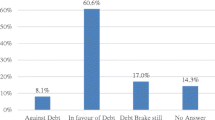Abstract
The Brady Initiative has led to the conclusion of several debt-relief agreements. Opinion on the effects of these agreements on the debtor countries involved vary widely. The following article aims at clarifying the debate.
Similar content being viewed by others
References
Cf. Jeffrey Sachs: The Debt Overhang in Developing Countries, in: J. Sachs (ed.): Developing Country Debt and Economic Performance, Vol. I, Chicago 1989; Paul Krugman: Market-Based Debt Reduction Schemes, NBER Working Paper No. 2587, Cambridge, Mass. 1988.
(IMF, World Bank, Japan)
Helmut Reisen: Über das Transferproblem hochverschuldeter Entwicklungsländer, Nomos-Verlag, Baden-Baden 1987.
Helmut Reisen: Public Debt, External Competitiveness, and Fiscal Discipline in Developing Countries, Princeton Studies in International Finance No. 66, Princeton, New Jersey 1989.
W. Max Corden: Debt Relief and Adjustment Incentives, IMF Staff Papers, 35 (4), pp. 628–643, 1988.
Vito Tanzi and Mario Blejer: Public Debt and Fiscal Policy in Developing Countries, in: K. Arrow and M. Boskin (eds.): Economics of Public Debt, St. Martin's Press, New York 1988.
Helmut Reisen: Public Debt, North and South, in: I. Hussain and I. Diwan (eds.): Dealing with the Debt Crisis, The World Bank, Washington D. C. 1989.
Sebastian Edwards: The International Monetary Fund and the Developing Countries: A Critical Evaluation, NBER Working Paper No. 2909, Cambridge, Mass. 1989.
J. Sachs, op. cit. The Debt Overhang in Developing Countries, in: J. Sachs (ed.): Developing Country Debt and Economic Performance, Vol. I, Chicago 1989;
P. Krugman, op. cit. Market-Based Debt Reduction Schemes, NBER Working Paper No. 2587, Cambridge, Mass. 1988.
W. M. Corden, op. cit..
See in particular Daiel Cohen: How to Cope with a Debt Overhang: Cut Flows Rather Than Stocks, in: I. Hussain and I. Diwan (eds.), op. cit..
Kenneth Froot: Buybacks, Exit Bonds, and the Optimality of Debt and Liquidity Relief, NBER Working Paper No. 2675, Cambridge, Mass. 1988.
Bert Hofman and Helmut Reisen: Debt Overhang, Liquidity Constraints, and Adjustment Incentives, OECD Development Centre Technical Paper No. 32, Paris 1990.
Eduardo Borensztein: The Effect of External Debt on Investment, in: Finance and Development, September 1989, pp. 17–19.
Jonathan Eaton, Mark Gersowitz and Joseph Stiglitz: The Pure Theory of Country Risk, in: European Economic Review, 30 (3), pp. 481–513.
Martin Hellwig: Comments on the Eaton, Gersowitz and Stiglitz paper, in: European Economic Review 30 (3), pp. 521–527.
Helmut Hesse: Aktuelle Probleme der Internationalen Verschuldungskrise, in: Deutsche Bundesbank: Auszüge aus Presseartikeln, Frankfurt, 20. 2. 1990.
Guillermo Calvo: Servicing the Public Debt: The Role of Expectations, in: American Economic Review, Vol. 78, No. 4, pp. 647–661.
Alberto Alesina: The End of Large Public Debts, in: F. Giavazzi and L. Spaventa (eds.): High Public Debt: The Italian Experience, Cambridge University Press, Cambridge 1989; Helmut Reisen: Public Debt, North and South, op. cit. in: I. Hussain and I. Diwan (eds.): Dealing with the Debt Crisis, The World Bank, Washington D. C.
World Bank: World Debt Tables 1989–90, Vol. 1, Analysis and Summary Tables, Washington D.C. 1989.
Author information
Authors and Affiliations
Additional information
This article is an abridged and translated version of a paper presented to the 1990 annual meeting of the German Verein für Socialpolitik.
Rights and permissions
About this article
Cite this article
Reisen, H. The Brady Plan and adjustment incentives. Intereconomics 26, 69–73 (1991). https://doi.org/10.1007/BF02929539
Issue Date:
DOI: https://doi.org/10.1007/BF02929539




